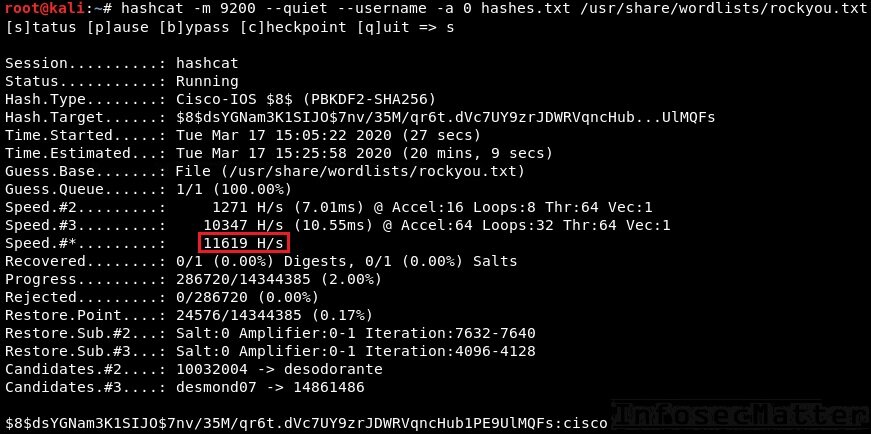

If you cannot force hashcat to start and do not have additional GPU (error clGetDeviceIDs(): CL_DEVICE_NOT_FOUND), then install a “native” target, which allows running OpenCL kernels on the host CPU. extended_luks_header passphrases-dictionaryĭisplay the number of CPUs to define used threads. The flags here identify our attack type (straight), hashing mode (Bitcoin), a request to use an optimized. Our execution of Hashcat would then look like. $ hashcat -force -hash-type 14600 -s 1002 -attack-mode 0 -outfile recovered_passphrase. In our case, we put the hash generated from bitcoin2john above in hash.txt and a list of possible passwords into wordlist.txt. Use -s option to skip the number of words. Tatus ause esume ypass heckpoint uit => s Device #1: autotuned kernel-loops to 256 Device #1: autotuned kernel-accel to 256 * Device #1: build_opts '-cl-std=CL1.2 -I OpenCL -I /usr/share/hashcat/OpenCL -D LOCAL_MEM_TYPE=2 -D VENDOR_ID=64 -D CUDA_ARCH=0 -D AMD_ROCM=0 -D VECT_SIZE=8 -D DEVICE_TYPE=2 -D DGST_R0=0 -D DGST_R1=1 -D DGST_R2=2 -D DGST_R3=3 -D DGST_ELEM=16 -D KERN_TYPE=14621 -D _unroll' Watchdog: Temperature abort trigger disabled. Watchdog: Hardware monitoring interface not found on your system.
#Hashcat speed words persecond password#
Maximum password length supported by kernel: 256 Minimum password length supported by kernel: 0 Hashes: 2 digests 2 unique digests, 2 unique saltsīitmaps: 16 bits, 65536 entries, 0x0000ffff mask, 262144 bytes, 5/13 rotates extended_luks_header passphrases-dictionary $ hashcat -force -hash-type 14600 -attack-mode 0 -outfile recovered_passphrase. To perform dictionary attack using hashcat version 5.1.0 you need to force execution (in case that OpenCL does not have any GPU available), define LUKS hash type, attack mode (straight), file to store found passphrase, file that contains possible passphrases, and extended LUKS header backup. The state file contains basic information and current progress. Warning: restoring state, ignoring options -b, -e, -f, -l, -m and -s.

Warning: using dictionary mode, ignoring options -b, -e, -l, -m and -s. $ bruteforce-luks -t 4 -v 60 -w state_file -f passphrases-dictionary luks_header_backup

To perform dictionary attack using bruteforce-luks version 1.3.1 you need to define the number of threads (see additional notes section), amount of time between printing progress information, session file that can be used to continue attack later, a file that contains possible passphrases, and LUKS header backup. Makes it print progress info to standard error and continue.

Sending a USR1 signal to a running bruteforce-luks process Then write the state to the file regularly (~ every minute). w Restore the state of a previous session if the file exists, m Maximum password length (beginning and end included).ĭefault: "0123456789ABCDEFGHIJKLMNOPQRSTU l Minimum password length (beginning and end included). f Read the passwords from a file instead of generating them. You can always get the source directly from bruteforce-luks GitHub repository. $ sudo dd if=/dev/sdb1 of=extended-luks-header bs=1M count=5ĥ242880 bytes (5.2 MB, 5.0 MiB) copied, 0.0273016 s, 192 MB/sĬreate a dictionary file with every possible passphrase combination, one per line. Luks_header_backup: LUKS encrypted file, ver 1 UUID: ac32a865-2716-43e3-8db9-798d4279a3a3įor hashcat you will also need the first sector from the payload. Store LUKS header backup as using the whole device can be very cumbersome. and then once it's working the way you expect, pipe your output to hashcat using wordlist mode ( -a 0) with your real wordlist.Perform a dictionary attack on the forgotten LUKS passphrase to access the encrypted device. $ pp64 -elem-cnt-min=4 -elem-cnt-max=4 wordlist.txt Tip: tinker with very short wordlists and observe the output directly: $ cat wordlist.txt Princeprocessor also includes some hashcat rules that are designed to maximize GPU utilization by adding a variety of permutations. It's specifically designed for multiword passphrases and similar "combination" work.Ī killer PRINCE feature is that it does all of the combination work for you without having to store all combinations on disk (which is probably what you meant by "heavy"?) You're looking for hashcat's related tool princeprocessor, also by hashcat's author.


 0 kommentar(er)
0 kommentar(er)
